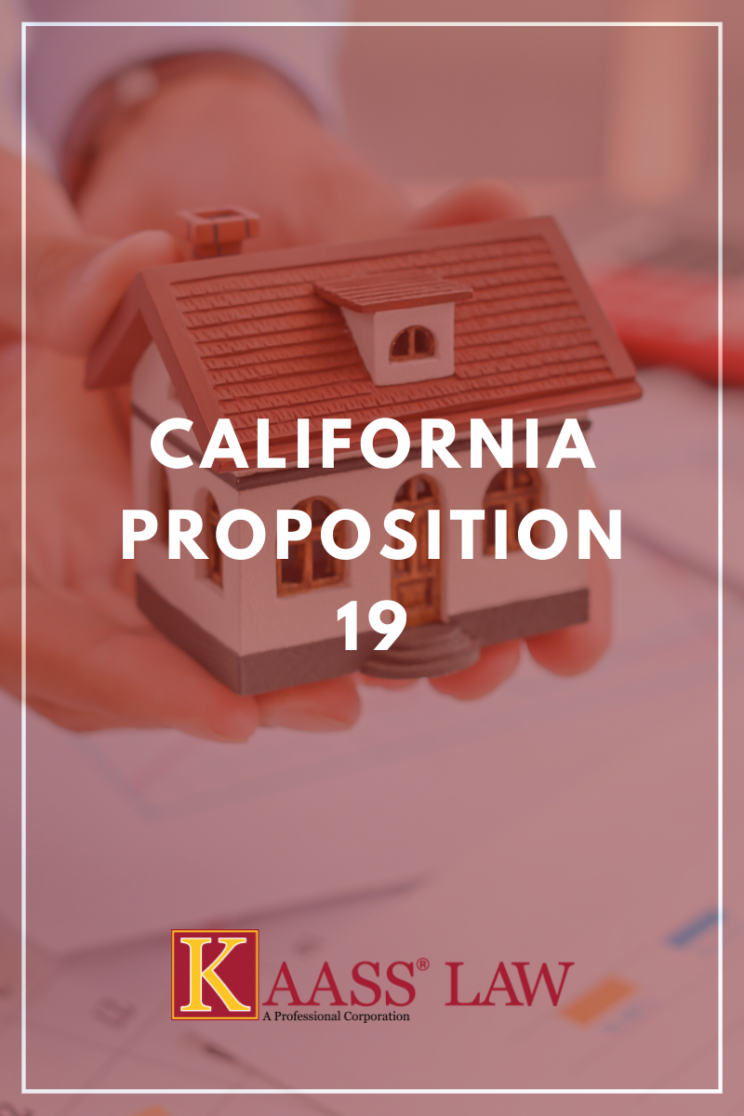On November 3, 2020, California voted in favor of Proposition 19. Passing this proposition gives a new property tax break to older homeowners while at the same time increasing property taxes for those inheriting their parents’ or grandparents’ properties.
Proposition 58: The Proposition Prior to Proposition 19
Proposition 58, is currently in effect and allows parents to transfer a primary residence to their children without any new fair-market reassessment, regardless of how the children chose to use the real property. In other words, this allows children to gain the same property tax basis that their parents enjoyed and the primary residence could be transferred with no cap on assessed value of the real property.
Additionally, before Proposition 19 was passed, secondary property, such as vacation homes, rental property, or non-residential property could be transferred with up to $1 million of the assessed value being exempt from the increase in property taxes regardless of its use by the children.
The Difference Between Tax Assessment and Fair Market Assessment
A tax assessment is the value attached to real property by the local government, specifically for the purpose of collecting tax money that is used to support the local community. On the other hand, a fair market assessment is the value attached to real property that is based on how much the real property on the open market would sell for.
Who is Prop Proposition 58 Most Favorable To?
Proposition 58 is most favorable to families that have owned real property with low assessed values. For instance, a 60-unit apartment complex in the San Francisco Bay Area purchased by a married couple in 1979 may have an assessed value just under $2 million. Under Proposition 58, the couple could transfer this property to their children without reassessment.
When Will Proposition 19 Become Effective?
Proposition 19 replaces Proposition 58. Beginning February 16th, 2021 the ability to transfer $1 million of assessed value of other property that is not the primary residence is completely eliminated.
Two Conditions Must Be Meet Under Proposition 19
The ability to transfer a primary residence between parent and child without reassessment will not apply unless two conditions are made. The two conditions are: 1) the parents’ primary residence must also become the child’s primary residence, and 2) the fair market value of the primary residence at the time of transfer cannot exceed the parents’ assessed value by more than $1 million. If, at the time of transfer, the difference between the assessed value and the fair market value of the home is more than $1 million, the new assessed value will be the fair market value less $1 million.
For example, if parents purchased a rental property in 1940 for $50,000, and the value of the rental property is more than $1 million when it is transferred to a child after February 16, 2021, the parents’ tax basis does not pass to that child. Therefore, the child will now have to pay the property tax based on the assessed fair market value.
Examples of how Prop 19 Works
Example of how Prop 19 works: a parent owns a home that is his primary residence and has a rental property in California. The home has an assessed value of $500,000 and a fair market value of $3 million. The rental property also has an assessed value of $500,000 and a fair market value of $2 million. Even though the properties have different fair market values, their property tax liability is similar because they have the same assessed value. The combined annual property tax of both properties with a property tax rate of 1.25% is $12,500. The parent now wishes to transfer both the properties to his daughter.
Result Before Prop 19
Result Before Prop 19: there is no reassessment on the transfer of either the home or the rental property from parent to daughter. The home can be transferred to the daughter regardless of its value because it is the parent’s primary residence, and the assessed value of the rental property falls below the $1 million threshold.
Thus, the combined annual property tax will remain at $12,500. There is no restriction on the daughter’s use of either property and the daughter may use both as investment properties if she so chooses.
Result with Prop 19 in Effect
Result with Prop. 19 in Effect: there is an adjustment to the assessed value of the home and a full reassessment on the rental property. The new assessed value of the home is $2 million because the fair market value exceeds the assessed value by more than $1 million (in that case, the calculation for the new assessed value is the fair market value of $3 million less $1 million). The new assessed value for the rental property is its fair market value of $2 million because no exemption to reassessment applies for transfers of real property from parent to child other than the primary residence.
Thus, the new combined annual property tax will be $50,000. Furthermore, the daughter has to use the family home as her primary residence or else the home will be reassessed to its fair market value of $3 million, which would increase the combined annual property tax for both properties to $62,500.
Los Angeles Real Estate Attorney
For more information on Proposition 19 we invite you to contact Our Los Angeles real estate attorney at (310) 943-1171.

